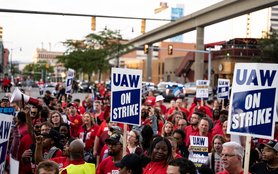The COVID-19 pandemic has exposed deep historic inequalities in our society.
Author: Kaitlyn Henderson, Senior Research Advisor, US Domestic Program
The COVID-19 pandemic has laid bare many truths, including—and importantly—the disproportionate impact of the virus on different communities based on historic inequalities. In the United States, these inequalities are based on intersecting realities of race, gender, and class. Oxfam America just released an interactive map and report of how states have responded to COVID-19 for workers and working families—and the differences in state actions are stark.
In the spring, when states began to disaggregate their COVID-19 data based on race and sex, suddenly a horrible picture became clear: communities of color—especially Black communities—were being hit harder by the virus.
Why is this happening?
The answer to why Black communities, especially those in the South, are seeing such deep and widespread damage from COVID-19 can be seen in historic inequities. The lack of resources available to Black communities in the South stem from state (and national) policies that have disenfranchised marginalized populations for decades. The decision not to expand Medicaid, for example, leaves many low-income workers and families without access to healthcare. Poverty wages and limited food assistance leave many without access to healthy food. Housing discrimination leaves many without safe shelter.
Moreover, all these policies lead to increased stress and anxiety that contribute to poor mental health. The Centers for Disease Control highlights how the negative mental and fiscal impacts of racial discrimination is a health risk, one that is being compounded by COVID-19.
The disproportionate representation of Black workers in essential workforces has also led to an imbalanced exposure to the virus. According to the Economic Policy Institute, Black workers make up one in six “essential” workers and are disproportionately exposed to COVID-19 on the job. And in southern states such as Mississippi, those jobs are predominantly held by Black women.
Joi Owens, Oxfam America’s senior Gulf Coast policy advisor, explains the importance of policy changes to lift up the communities where she works.
“As a Black single mother living in Mississippi, I personally know the importance of advancing policy issues that create an equitable Mississippi, especially for women who look like me. In a locally led effort, through our partners such as NAACP, Black Women’s Roundtable, and One Voice MS, we work to galvanize Black women in the south and push forward a robust policy agenda focused on women’s economic security. We want our state to support women at work, pay them a decent wage, and create meaningful opportunities for employment to overcome struggle and poverty.”
As Jarvis Dortch, executive director of Mississippi’s affiliate of the ACLU and former Mississippi House representative, explains, “Low-income Mississippians, particularly people of color, disproportionately work in ‘essential’ service jobs that put them at great risk of exposure to COVID-19.”
But Dortch highlights a way for the Mississippi workforce to be better protected. “Despite their work being essential to our economy, these jobs likely don’t offer insurance, but these Mississippians would have health coverage if the Mississippi legislature expanded Medicaid.”
What can be done?
Expand Medicaid
As captured in our index, Alabama, Georgia, and Mississippi have not expanded Medicaid, making it harder for families on the margins to have access to healthcare. And as demonstrated by a recent report from the Center on Budget and Policy Priorities, there are many benefits to expanding Medicaid that go beyond giving more people access to healthcare. When healthcare costs are covered or lowered, financial security goes up as medical debt goes down, creating more space for economic mobility, greater access to credit, and even lowers the costs of hospitals as their budgets stay more balanced. Of the 12 states that have not expanded Medicaid, nine are in the South and all have large Black populations.
Pass paid leave
Until the federal government mandates paid leave, states and territories must pass paid leave laws themselves. Even when the world is not in the middle of a health crisis, the ability for workers to have paid days off (whether for illness or family care) is crucial for community health. When workers do not have to go to work ill, it keeps viruses from spreading and the community healthier overall. As our index shows, the southern states that rank at the bottom do not offer any kind of paid leave.
While local initiatives such as these are crucial, state governments must still step up and fill the gaps left by the federal government. As we wait for the federal government to create another relief package, Black communities are being unfairly and unequally impacted by this pandemic. State governments must act to protect their residents from unnecessary exposure and sickness. Expanding Medicaid and passing paid leave are two vital steps in the right direction.



